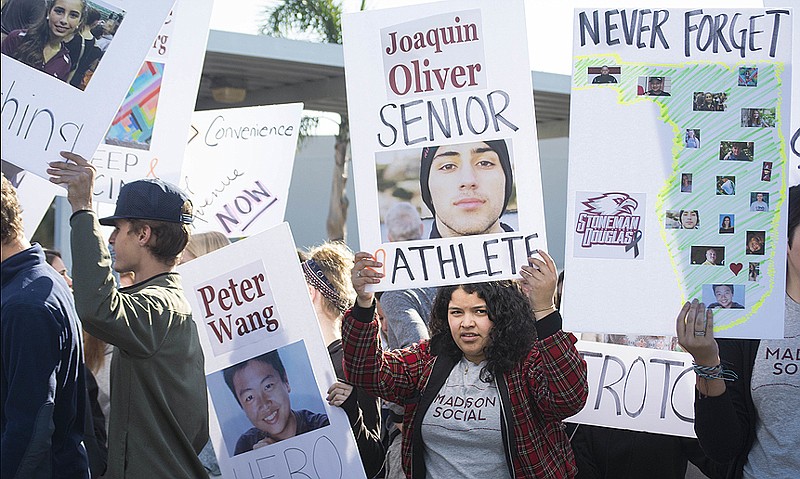- November 22, 2024
-
-
Loading

Loading

“The evidence should make gun-control advocates pause, as all the gun bans that I have studied show that murder rates increase after the ban is enacted.” — John R. Lott Jr., “More Guns, Less Crime”
We all know it’s pretty much of a no-win game to wade into the debate about guns. It can make otherwise rational people go ballistic.
So we won’t attempt to convince anyone what’s right or wrong. As full disclosure, however, and probably no surprise, we line up in the founders’ camp on the Bill of Rights and fully embrace the second one:
“A well regulated Militia, being necessary to the security of a free State, the right of the people to keep and bear Arms, shall not be infringed.”
But, of course, we also know once you lift the cover and look behind those words, there is an endless labyrinth of questions that have arisen in the 230 years since the founders ratified that right. Even though it says “right of the people … shall not be infringed,” being the flawed human beings we are, it’s human nature to challenge (or ignore) the rules (See Adam and Eve).
And so we question and debate: Who can bear? What kind? How many? How big? Where?
As always, those questions become a tidal wave whenever some deranged person goes berserk — a la Nikolas Cruz at Marjory Stoneman Douglas High School in Parkland.
So if you put yourself in the shoes of Gov. Rick Scott or any of the Florida legislators immediately after the Cruz shootings, surely you can identify with their urge to do something!
It’s the natural political instinct. When something goes wrong, the standard response is to create laws, or amend the ineffective laws, to right the wrong. And when things go really wrong, as they did at Stoneman Douglas High, lawmaker-politicians instinctively look into the media cameras and say: “We’re going to do everything we can to ensure this never happens again.”
We know, of course, that no matter what they do in Tallahassee or Washington, lawmakers will never stop these bad things from happening again. They might impede them, but they won’t stop them.
Nevertheless, Florida’s lawmakers had to act. That, or give up their seats at the next election.
In the end, amid the chaos and pressure of the moment, and with less than a month left to the regular session, the governor and Legislature pulled it off — to their credit. They crafted what became a 105-page bill that focused on three pressing issues that arose in the wake of the Parkland tragedy: how to address students and others with mental disorders who are apparent threats to themselves and others; how to prohibit or impede firearm possession that involves people who have been adjudicated “mentally defective;” and steps to be taken to increase security at the state’s public schools.
When you begin inspecting the details of Senate Bill 7605, it does all that. But it is almost overwhelming in its dozens and dozens of new mandates on law enforcement agencies, the courts and public schools. Here’s a safe bet: The Marjory Stoneman Douglas Public Safety Act will cause the creation of mental health crisis experts, departments and bureaucracies in every sheriff’s office and school district — all for good reason and good intentions.
But it’s the old story: Credit the governor and Legislature for acting, yes. But time will tell the effectiveness of the new law. You can predict this, too: When the Legislature funded the new law, it did so with $200 million of recurring revenue from the general budget, and $200 million of nonrecurring revenue. As every school board member will tell you, the Legislature is infamous for imposing new demands on local officials — with no money to do it. This law will raise new pressures on what gets funded in the future — teacher pay or protecting kids?
Altogether, you can judge the governor and Legislature as responding as they should have, given the circumstances.
With anti-gun forces shouting and high-schoolers lecturing them, they resisted, surprisingly, the demands to ban guns, in particular the ones they call “military assault rifles." (See box) The one ban on which the lawmakers did acquiesce (cave?) was adopting the provision that prohibits anyone under the age of 21 from purchasing a firearm.
That was a sop, of course, albeit a flimsy one. To one extent, you could say they had to do that, too. They’re politicians. They had to do something that would bend, even a little, toward the protesters.
But on the day the Legislature adopted Senate Bill 7026, the National Rifle Association sued, protesting the under-21 ban on firearm purchases. It cited the words: “the right of the people to keep and bear Arms, shall not be infringed.”
That reminded us of the comment preachers often tell their congregations: When God gave Moses the 10 Commandments, God did not say they were suggestions.
To be sure, the nation’s gun debates will go on. Guns are scary, and dangerous. Duh. But if you read the work of John Lott Jr., founder and president of the Crime Prevention Research Center and a world-renowned expert on guns and crime, he has convincing data that shows the title of his best-selling book is true in real life: “More Guns, Less Crime.”
Lott: “Allowing citizens to carry concealed handguns reduces violent crimes, and the reductions coincide very closely with the number of concealed-handgun permits issued. Mass shootings in public places are reduced when law-abiding citizens are allowed to carry concealed handguns.”